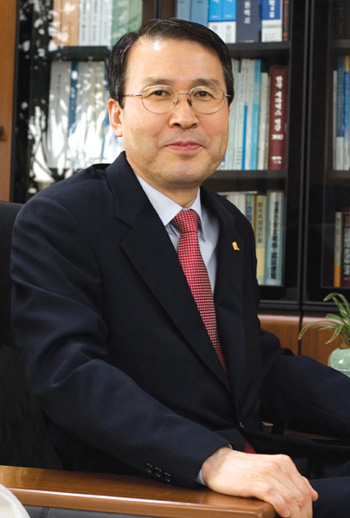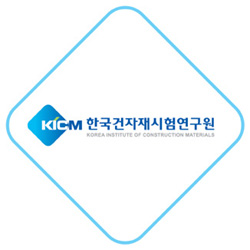KICM Plays Pivotal Role in Green Growth Paradigm


Lately, the social paradigm ¡°green growth¡± is aimed at maximizing synergetic effects of two values ¡ªthe environment and economic growth. Green growth is a national comprehensive vision for dealing with not only energy and environmental problems, but also creating jobs, expanding new growth engines, reforming corporate competitiveness, territory & cities, architecture, traffic and lifestyle. Speaking in the macroscopic perspective, this paradigm covers not just construction, traffic, culture and other social systems, which are directly and indirectly related to the Korea Institute of Construction Materials (KICM), but even an individual¡¯s lifestyle.
Accordingly, modern architectural structures are designed and constructed with construction materials conducive to improving human beings¡¯ lives and creating a pleasant living space, taking into account environmental-friendliness, energy efficiency, safety and other diverse functions. Advanced countries apply a variety of regulations, guidelines and recommendations to regulate the safety and environmental-friendliness of construction materials as well as setting them up as barriers in connection with trade. This ensures the protection of their people, since these materials come in such a large variety and have complex impacts.
Amid the current global economic situation and the diversifying of market demands, such technical restrictions on the safety, environmental-friendliness and energy efficiency of construction materials have been stepped up, and the compliance testing and certification markets have expanded according to external positive factors, including each country¡¯s continuous growth policies and more stringent safety and environmental regulations. In reality, Korean businesses find their technological levels falling behind their counterparts in advanced countries.
In this regard, KICM is Korea¡¯s one of the most prestigious government-authorized testing institutions in construction materials field, which is fitted with advanced testing equipments and excellent expert manpower to carry out toxic substance analysis, construction materials and recycling, construction external and internal materials, construction structure, timber and concrete materials and other materials tests. It is taking the lead in the technological development of related industries and quality improvement by offering such services as testing and certification corresponding to international conformity assessment systems.
KICM not only provides test and certification services in a fast and precise manner in order to facilitate smooth market entry of products in the related industries under the global competitive regime, but spares no efforts to forge a co-prosperity framework with companies by playing leading roles in setting Korean and international standards as a member of the Cooperating Organization for Standard Development (COSD) in order to enhance the value of each brand.
Since its establishment in 1994 in accordance with a decision of the Presidential Administration Reform Commission, KICM has devoted itself to enhancing people¡¯s quality of life by ensuring the safety of construction structures, solving pending construction issues, including the provision of technology for helping related industries cope with a changing global environment, and nurturing an advanced construction culture through strengthened capability buildup and the fast, precise and fair execution of responsibilities.
KICM has three divisions, eight centers and eight support teams and a staff of 250, 60 percent of whom hold a master¡¯s or higher degrees. KICM is the sole comprehensive service provider to offer one-stop services, including tests on quality improvement and technology innovation of construction materials firms, research, Korea Standard (KS) audit, standardization, consulting, education and technological guidance. KICM operates 30 accreditation programs authorized by the government. The institute continues to make efforts to improve management efficiency by building a fair performance evaluation system for a dynamic organization and the motivation of employees as well as introducing such diverse management systems as laboratory information management system(LIMS) and management information system(MIS).
The Construction Materials Standardization Study Group is a government-funded project designed to lay a foundation for a safety-oriented construction culture through the overall testing and evaluation of the construction materials field and to conduct R&D tasks of the future construction industry. The group performs research on the standardization and informatization of construction materials in the interest of convenience for customers. Under a government-funded project in the durability test and evaluation field, the weathering test and marine ecology testing laboratories are operated to test and evaluate the durability of materials and products exposed to weather conditions identical to real ones ¡ªworld-class test-beds whose test and evaluation services serve as a force behind Korean products¡¯ overseas entry due to a linkage of state-to-state networks.
A comprehensive fire safety testing facility designed to evaluate safety and environmental-friendliness of structures are in place to provide services related to fire safety experiments. This internationally-recognized testing and evaluation system can be applied regardless of diverse construction engineering methods. As the significance of prolonging the life of structures and their repair & maintenance is highlighted, the performance test on diverse waterproofing materials, repair reinforcement materials and an evaluation system for designating waterproofing materials suited to specific environmental conditions are offered in a systematic fashion, and to this end, a ¡°resistance to root penetration¡± facility is in place to test and evaluate water-proofing and root barrier materials used for rooftops and artificial ground green areas.
As the public demand for the functionality of construction materials and the easing of the new house syndrome rises, testing data in special experiment areas like far infrared testing, biotechnological experiments, deodorization testing, negative ion testing, and air purifier performance testing are applied in both the advanced construction and architecture areas. It also provides the outcomes of reliability tests and data by using roughly 1,400 types of advanced equipment in such areas as quality performance testing, functionality and other tests on electric, electronics, machinery, automotive parts and other capital goods as well as industrial products.
In accordance with a paradigm shift from a customer demand for quality to a request for quality assurance for the expected longevity of products, KICM is a government-authorized reliability testing and accreditation agency in the chemical materials field to conduct reliability tests and evaluations and accredit the reliability service ¡°R¡± mark. In order to secure international competitiveness, KICM is seeking to sign MOUs with several testing agencies across the nation. It also provides support for certifying Korean exporters¡¯ products according to international standards through cross-certification and technological exchanges with such advanced test and accreditation agencies as Japan Weathering Test Center, China Electric Apparatus Research Institute, Atlas Weathering Service Group, Institute for Testing and Certification and Germany¡¯s T†V, as well as to step up efforts to beat technical barriers to trade.
Based on its duty, infrastructure and expertise, KICM continues to innovate with the goal of evolving into a world-class testing and evaluation agency in the construction, safety and environment areas. KICM is turning to securing technology related to such areas as green technology and new materials as well as the expansion of new business areas, including so-called new green construction and specially designed structures like super-long bridges, high-rise buildings and pre-stressed concrete containment structures and the buildup of ondol heating systems infrastructure. It strives to focus on the development of technologies related to construction and new industrial materials for building safer and more convenient social infrastructure and a balanced environment as well as to create the new ¡°Blue Ocean¡± areas and secure such new growth engines as new and renewable energy performance evaluation infrastructure buildup and certification services in order to respond to global environmental changes and meet the rising demands of the times. nw
By Ahn Byung-man, president of the Korea Institute of Construction Materials (KICM)
3Fl, 292-47, Shindang 6-dong, Chung-gu, Seoul, Korea 100-456
Tel : 82-2-2235-6114 / Fax : 82-2-2235-0799